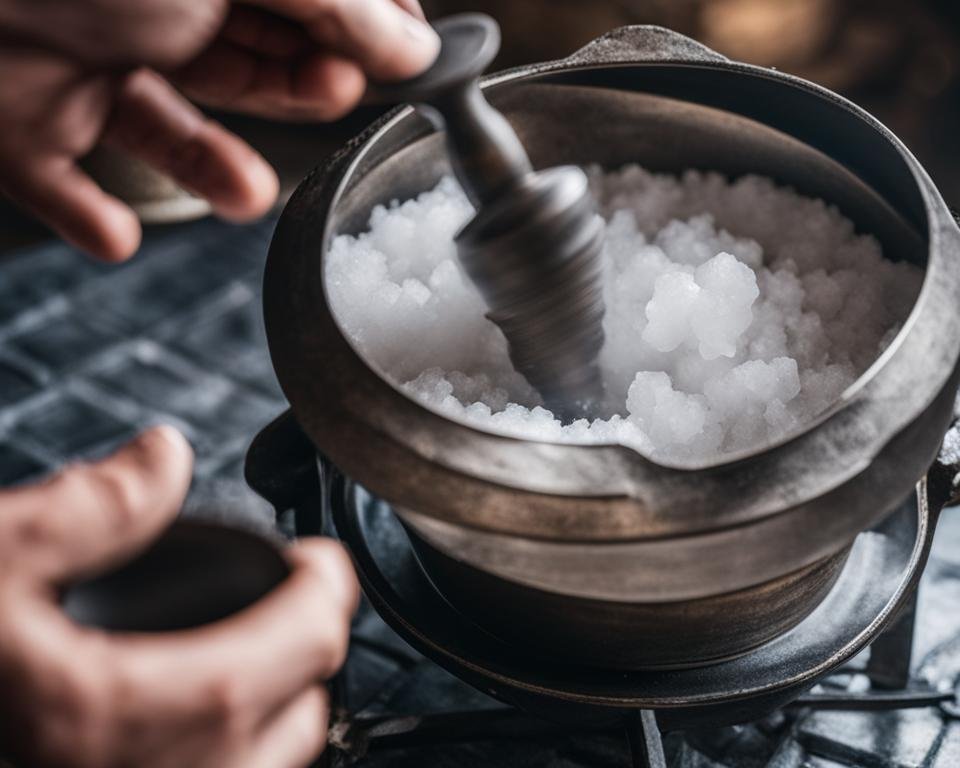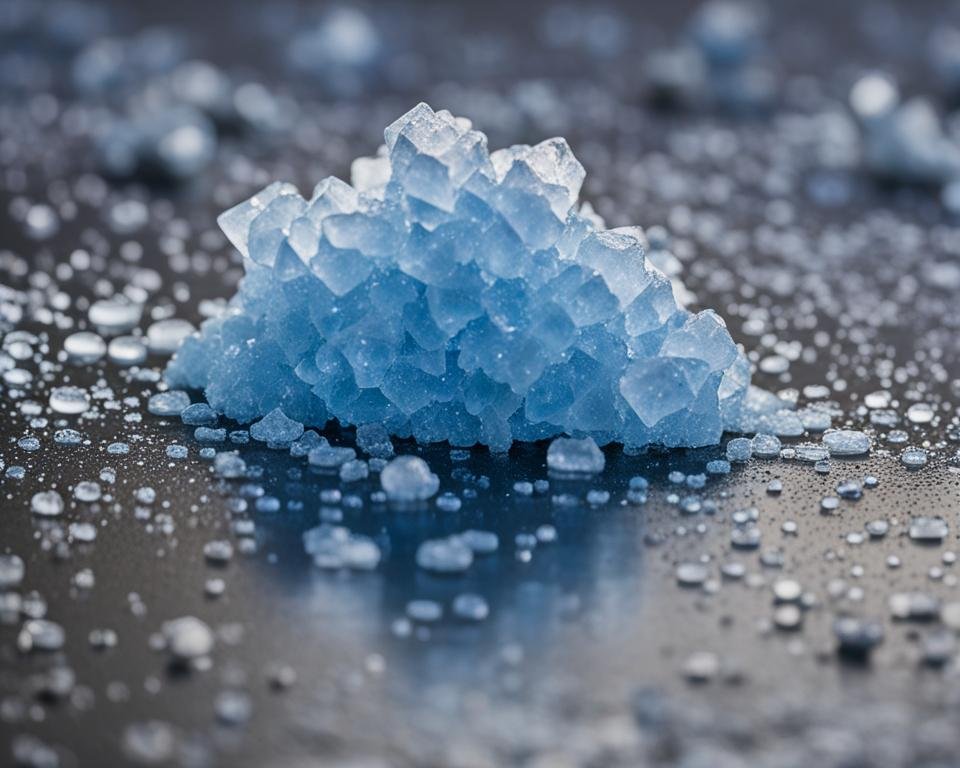Halite, also known as rock salt, is a versatile mineral that has various uses and applications in different industries. Its chemical composition and physical properties make it an ideal choice for numerous purposes, from culinary to industrial use.
In this article, we will explore the many applications and uses of halite, highlighting its versatility and practicality in different fields. From culinary to industrial and even in the beauty industry, halite is a valuable mineral that offers numerous benefits.
Key Takeaways
- Halite, or rock salt, has numerous industrial, culinary, and medicinal applications.
- Halite is widely used in road safety, water softening, and chemical production.
- Halite is also a staple ingredient in various culinary dishes due to its natural flavor-enhancing properties.
- Halite is commonly used in beauty treatments, such as bath soaks and salt scrubs, for its therapeutic benefits.
- Halite has historically been used for its medicinal properties and has been linked to various health remedies.
Culinary Uses Of Halite
Halite, or rock salt, is a versatile seasoning that has been used in cooking for centuries. Its natural properties make it an ideal flavor enhancer, preservative, and seasoning for a variety of dishes.
Flavor Enhancer
Halite has a unique ability to enhance the natural flavors of foods without overpowering them. When used in moderation, it can bring out the sweetness of fruits and vegetables, add depth to savory dishes, and even elevate the flavor of desserts.
Food Preservation
Halite is also commonly used in curing meats and fish. The salt draws out moisture from the food, creating an inhospitable environment for bacteria and other microorganisms. This process not only preserves the food but also imparts a distinct flavor that is highly sought after by food enthusiasts.
Seasoning
Halite is an essential seasoning in various cuisines around the world. Its distinct flavor and texture make it a staple in many dishes, from homemade bread to grilled meats. The salt is also a popular ingredient in spice blends, such as seasoned rubs for barbecue and marinades for seafood.
Halite is an all-natural alternative to processed table salt, providing an unmatched depth of flavor and nutritional benefits. As with any seasoning, it is best used in moderation to avoid overpowering the natural flavors of the ingredients.

Water Softening With Halite
Halite, also known as rock salt, is often used in water treatment to remove minerals and soften hard water. Hard water can cause scaling and damage to plumbing fixtures, appliances, and can negatively impact the taste of drinking water. Using halite in the ion exchange process, the minerals in hard water are replaced with sodium ions, improving water quality and taste.

To soften water with halite, it is typically added to a brine tank in a water softener system. As hard water flows through the resin bed, calcium and magnesium ions are removed and exchanged with sodium ions from the halite. The resin bed is periodically regenerated by rinsing with a strong brine solution, removing the accumulated minerals and restoring the resin’s ability to exchange ions.
Water softening with halite can prolong the lifespan of household appliances and decrease the need for chemicals in cleaning products. Additionally, it can save on energy costs associated with heating water, as softened water requires less energy to heat than hard water. Overall, adding halite to a water softener system can improve the quality of life for individuals and families by providing better-tasting, more manageable water.
Halite In Road Safety
Halite, also known as rock salt, plays a crucial role in road safety and maintenance during the winter season. Its de-icing properties make it the most common road salt for preventing ice formation, ensuring safe driving conditions.
Winter maintenance crews rely on halite to help keep roads clear and safe to drive on. When mixed with water, halite forms a brine solution that can lower the freezing point of water, preventing ice from forming on roads even when temperatures are below freezing.
Due to its effectiveness, affordability, and ease of availability, halite is the go-to choice for municipalities and road maintenance crews across the world. It is an indispensable tool in their arsenal, helping to ensure road safety and minimize the risk of accidents during the winter months.

Industrial Uses Of Halite
Halite has proven to be a valuable resource in many industrial applications. One of the most significant uses of halite is in chemical production, where it is commonly used as a source of sodium chloride, a key component in the manufacturing of many chemicals, including chlorine and caustic soda.
Another important application of halite is in the oil drilling industry. Halite is used to create brine solutions that are injected into oil wells to increase the production rate of crude oil. The brine solutions can also be used to dissolve formations that are blocking oil flow.
Halite also plays a critical role in the extraction of metals like copper and nickel. When combined with water, halite helps to create a brine solution that can dissolve the metal ores and facilitate their extraction from the ground. This is done by pumping the brine solution into the ground and then extracting the metal-rich fluid that emerges.

In addition to these applications, halite is also used in smaller-scale industrial processes, such as the production of dyes and detergents. Its versatility and abundance make it a valuable resource in many industries.
Other Applications of Halite
Halite has a myriad of uses, many of which are unknown to most people. In addition to its culinary and industrial applications, halite has found its way into the beauty industry.
Halite is a key ingredient in many beauty treatments, particularly in salt scrubs and bath soaks. Its exfoliating properties help to remove dead skin cells, leaving the skin smooth and rejuvenated. Additionally, halite is known to have therapeutic benefits due to the presence of trace minerals like magnesium, potassium, and calcium, which help to soothe sore muscles and improve circulation.
Another popular use of halite is in salt lamps. These lamps are believed to have several health benefits, including improving air quality, reducing allergies, and promoting better sleep. The lamps emit negative ions, which neutralize positively charged ions in the air, promoting a relaxing and calming atmosphere.
Halite has also been used for centuries in traditional medicine as a natural remedy for various ailments. It is believed to have antibacterial and anti-inflammatory properties, making it an effective treatment for skin conditions like acne and eczema. Additionally, halite is used in inhalation therapy to treat respiratory disorders like asthma and bronchitis.
In summary, halite is a versatile mineral with a wide range of uses, including culinary, industrial, and beauty applications. Its therapeutic and health benefits make it a valuable addition to any wellness routine.




